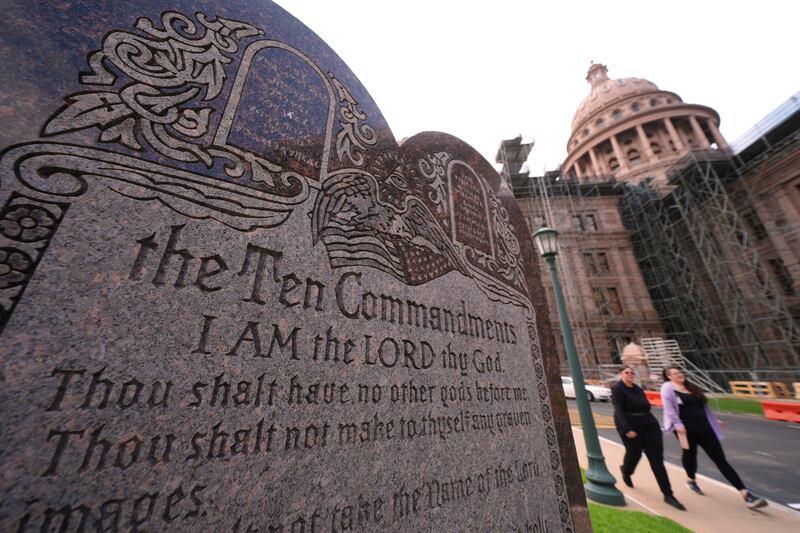This article was first published in the State of Faith newsletter. Sign up to receive the newsletter in your inbox each Monday night.
When kids in Texas return to school this week, many will notice a new fixture in the classroom — the Ten Commandments poster. A new state law, which went into effect on Monday, Sept. 1, requires every public school classroom to display one.
Some classrooms though will remain bare of the displays, at least for now. On Aug. 20, a federal judge granted a preliminary injunction to 11 school districts in response to a lawsuit from parents and advocacy groups, blocking the display of the Ten Commandment posters in those districts while litigation continues.
The rest of the schools will have to abide by the law, said the state’s attorney general Ken Paxton. “The woke radicals seeking to erase our nation’s history will be defeated,” Paxton said. Under the statute, each poster must measure at least 16 by 20 inches.
The schools don’t have to spend their own funds on the posters — although they can if they want to — but they are required to accept any privately donated posters or copies that fit the law’s requirements.
That provision has fueled a surge of donations from conservative political and religious organizations. Texas Values, which promotes “biblical, Judeo-Christian values,” contributed $6,000 to cover posters for 6,000 classrooms. Restore American Schools, a partner initiative, says it has helped provide displays for more than 156,000 classrooms in Texas, offering bulk sponsorships for $1 per poster. Love Heals Youth, a Christian nonprofit, delivered over 5,000 posters to public schools, including 230 posters to different private Christian schools.
Some districts and lawmakers have chosen to pay for posters themselves, even though they don’t have to. For example, Frisco Independent School District, with more than 4,000 classrooms, spent $1800 on the posters. State senator State Sen. Phil King, R-Weatherford, said he spent $7,500 for the posters in his district.
As of Aug. 29, some districts, who aren’t part of the lawsuit, have received no donations. “We have had groups inquire about making donations, but so far, no donations have been made,” Jackie Simien, spokesperson for Beaumont Independent School District, told me in an email. The district has no plans to use its finding, she said, but it welcomes ”donations that meet the state requirements."
Supporters of the law claim that the Commandments are a historical document and shape the moral character of the citizens. “To post the Ten Commandments in the classroom is not an imposition of the Christian religion by the state but an acknowledgment of history by public schools,” writes Daniel Darling.
Opponents, however, say that the law violates the separation between church and state and “crosses the line from exposure to coercion.”
“It feels like I don’t have control over what my kid is seeing,” one parent in Texas said. “The state sends an unintended but clear message that some students belong more than others.”
As the Ten Commandments laws continue to go through the courts in Texas, Louisiana and Arkansas, their fate will test how far states can go in integrating religious expression into public education, and whether judges deem these classroom posters as secular sources of history and morality, or as the government’s endorsement of faith.
Fresh off the press
- Cakes are back in the courts: A California cake decorator asks Supreme Court to hear her case.
- Where do clean swears ‘heck,’ ‘gosh’ and ‘dang’ come from? My colleague Jacob Hess explores.
- Jennifer Graham takes an in-depth look at how the crisis of men is playing out in politics. “The good news is, suddenly lots of hands are coming on deck. And one reason is the reelection of President Donald Trump, an event that has caused soul-searching in the Democratic Party about what is happening with America’s young men."
What I’m reading
- One of the girls at the Annunciation Church in Minneapolis was injured while shielding another student. Another boy who was brought to the hospital asked the doctor: “Can you say a prayer with me?” Here are some stories of the victims of the Catholic school shooting. — Stories of bravery and heartache emerge from Minneapolis church shooting, AP
- Meet Bishop Michael Pham, a Vietnamese American priest in San Diego, who is speaking out about migrant issues. “Pham, other clergy members and faith-motivated volunteers have since expanded the effort into what are now daily vigils to offer support to migrants during their immigration hearings. They want to be a visible witness of God and, Pham said, restore dignity to the experience of migrants in a country and church that are full of migrants.” — He was a child refugee. Now he’s a bishop navigating Trump’s deportation push, Washington Post.
- Richard Garnett, law professor at the University of Notre Dame, writes that recent Ten Commandments laws reflect a legal and cultural revival of a practice long seen as unconstitutional, but the Supreme Court’s recent decision in Kennedy v. Bremerton School District has unsettled prior precedent, including the “Lemon” test. This has created uncertainty over how courts will now evaluate the “secular purpose” of government actions involving religion. — The Ten Commandments and a “secular purpose," SCOTUSblog.
Odds and ends
You may not think of the Vatican as a performance venue, it’s going to transform into one on Sept. 13. Italian tenor Andrea Bocelli and pop star Pharrell Williams are codirecting a concert called “Grace for the World,” that will include John Legend, Karol G, and Jelly Roll, and a 250-person international choir, among other musicians.
The concert will take place on St. Peter’s Square and it will mark the closing of The World Meeting on Human Fraternity, a conference that’s usually attended by artists, athletes, and politicians.



